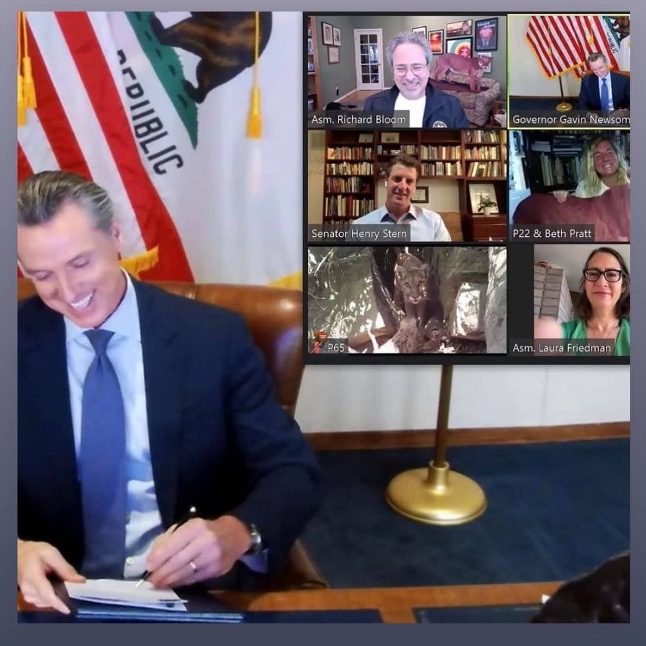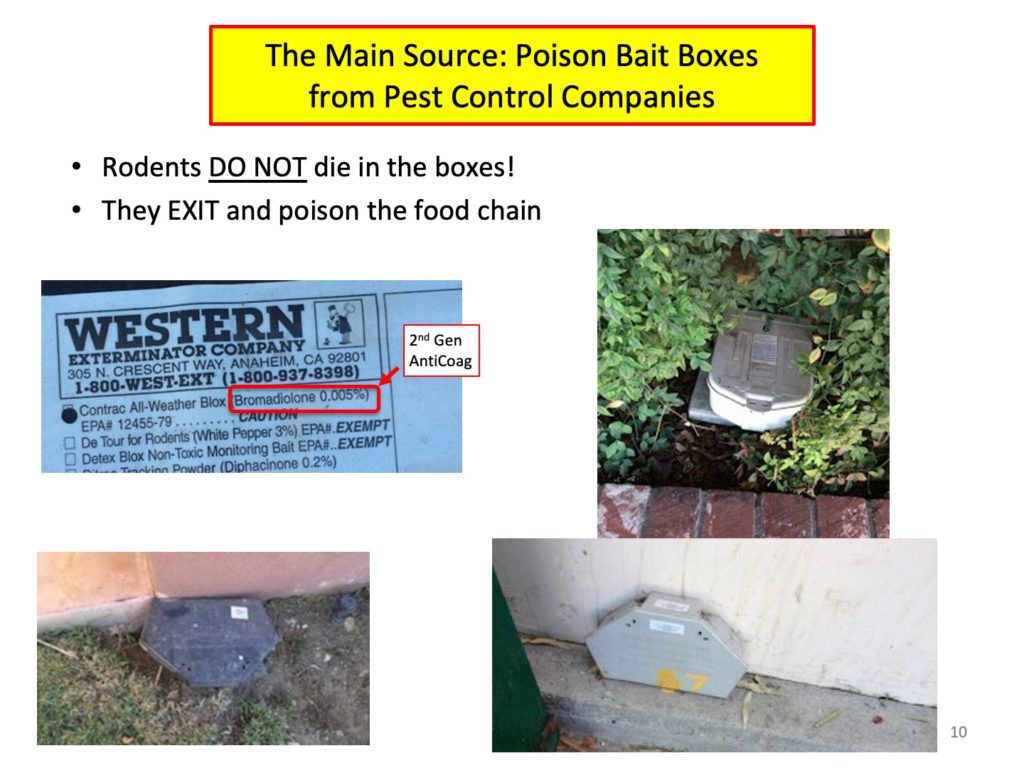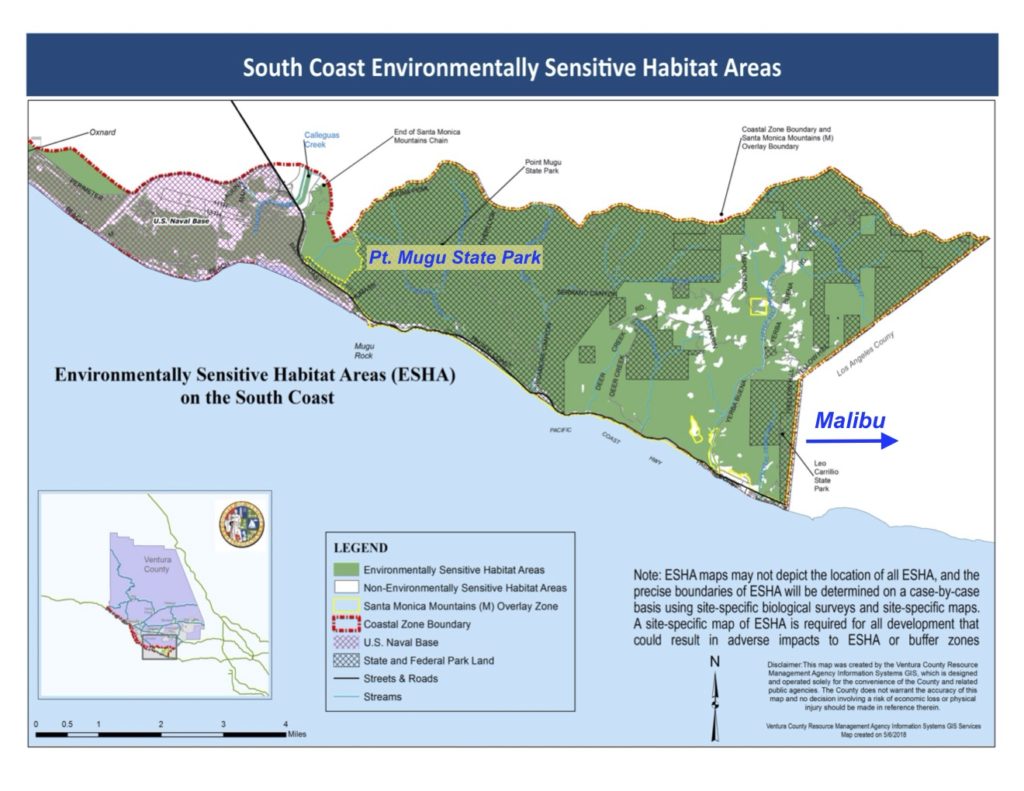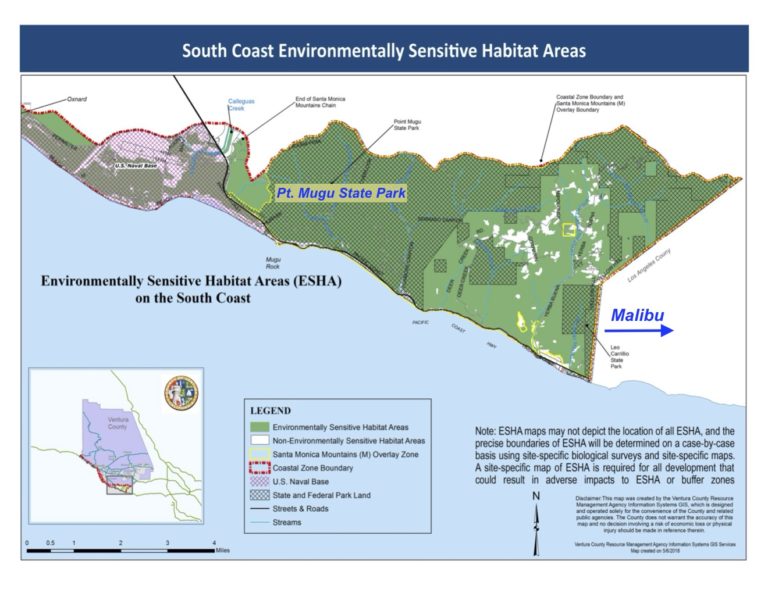California Bill AB 1322
California State Assemblymember Laura Friedman has introduced a bill to ban first generation anticoagulant rodent poison diphacinone. Here is information about it.
Fact Sheet from sponsor State Assemblymember Laura Friedman.
Los Angeles County Board of Supervisors February 28, 2023 support for banning diphacinone statewide.
Poison Free Malibu support letter submitted March 23, 2023 to California legislature advocate website.
Approved by the Assembly Environmental Safety & Toxic Materials Committee March 28, 2023.
California Bill AB 1788
UPDATE: 9/3/20
Governor Newsom SIGNED IT!
It becomes the law on January 1, 2021.
AB 1788 puts a moratorium on the use of 2nd generation anticoagulant rodent poisons by pest control service companies while the California Department of Pesticide Regulation comes up with new regulations, which hopefully continue the ban.
Governor Newsom signing AB 1788 September 29, 2020

- Beyond Pesticides announcement – Malibu California Passes Pesticide Ban in a Big Win for Local Wildlife
- In Defense of Animals announcement – Victory: Malibu City Council Bans All Pesticides!
Here is how to report illegal use of 2nd generation anticoagulant rat poisons
First, verify that the poison in the bait box is one of the four illegal ones.
The four are bromadialone, brodifacoum, difethialone, and difenacoum.
ALL bait boxes MUST have labels (click for the law wording, page 3.5) with the product inside indicated.
In the photo below, “Bromadialone” is the active poison, one of the four illegal ones.
Next, please report the 2nd generation anticoagulants. Also report if there is no label or if it is illegible.
The Agency in charge is the County Agricultural Commission for your county.
Los Angeles County:
Website: acwm.lacounty.gov/environmental-protection-bureau/
Phone: 626.575.5466
Email: envprot@acwm.lacounty.gov
Ventura County:
Website: www.ventura.org/agricultural-commissioner/pesticide-use-enforcement/
Phone: 805.388.4222 or 805.933.2926
Email: ag.inspector@ventura.org or venturacountyag.commissioner@ventura.org
Throughout California:
Phone: 877.378.5463
Website: www.cdfa.ca.gov/exec/county/countymap

Your City Can Ban PESTICIDES on City-Owned Property - Parks and Buildings
Here is How to Go About It
Click here for slides on How to Get Your City to Adopt a Pesticide-Free Policy
Malibu Earth Friendly Policy
Click here to see the official Malibu Earth Friendly Policy on our Earth Friendly Management webpage.
Help Eliminate Poison Bait Boxes
Include your city’s Resolution opposing rodent poisons if it has passed one.
Here is a list of municipalities with Resolutions.
A copy of the city dumpster ordinances from the city’s Municipal Code. To find it, try Googling “{city name} municipal code”. Most cities have ordinances specifying that it is ILLEGAL TO LEAVE DUMPSTERS OPEN and trash on the ground.
Does the city have an educational pamphlet created by the city? Some that do are Malibu, Calabasas, Agoura Hills, Thousand Oaks, Ojai, Camarillo. Here are examples.
• Educational graphics including a useful diagram showing how the poisons go up the food chain: Educational Graphics
• Photos of animals before and after poisoning. See Poisoned Animals
• A letter of concern to the particular business summarizing the issue. We have examples of such letters on request.
• See our Rodents page for recommendations on rodent control.
Shopping malls, restaurants, businesses, and residential complexes are big users of poison bait boxes.
• Check in back of the malls and restaurants and businesses where the dumpsters arelocated.
• Bait boxes come in various colors and shapes – black, silver, white, gray box shape or some that look like fake plastic rocks.
• A label showing what ingredient is in use is required by law.
– Usually, the ingredient is one item checked off in a list
– Do not handle the bait box
– The bait box by law must be tethered down
– Photograph the bait boxes, including the label clearly.
– Some bait boxes contain snap traps or repellents, not poison.
• See above Types of rodent poisons –to identify and understand the INGREDIENT (not just the product name).
• Photograph the local dumpster situation. See Dumpsters for a check list on what can go wrong. Show the photos to the management. Recommend locking dumpsters and finding a pest control service that uses repellents. Western Exterminator is one example.
The city or Chamber of Commerce may have a listing of local businesses that are potential poison bait box users to canvas.
• At shopping or business complexes, it may be individual businesses or the overall property management that is in charge of obtaining the pest control service. Ask the businesses what the situation is. If it is the overall property management, get the contact information.
• Start a dialogue.
– Obtain email address to send educational information to.
– For individual small business, bring educational pamphlets in hand and ask for an appointment to see the manager or owner
– When educating larger chain stores, also obtain a corporate email address from the local management to start communication as the decision making authority may not be the local management.
– Restaurants sometimes are under the misconception that rodent poisons are necessary to obtain the “A” grade. This is completely untrue.
– Inform businesses that they will SAVE MONEY by getting rid of the monthly fee for resupplying the poison bait boxes.
• Homeowner Associations are big users of rodent poisons.
– Is there an HOA member who is upset about the use of poison bait boxes? Have them set up a meeting with the HOA Board or the HOA membership. We have given talks at many HOAs partnered with a wildlife biologist from the National Park Service which has an excellent outreach program.
Malibu Dumpster Ordinance
The ordinance in detail, finalized April 2020, is here.
There is a CORRECT way to deal with excess rodents in commercial contexts.
It’s simple – STOP BREEDING THEM!
Yes, that is overwhelmingly what can be seen behind shopping centers, restaurants, and other food-serving businesses.
Dumpsters open, overflowing, and with food trash on the ground.
This provides a plentiful supply of food to multiply rodents!
And then, ridiculously, the poison bait boxes are placed there to counter this uncaring sloppiness.
See our section on DUMPSTERS.
Most cities and counties actually have ordinances that mandate dumpsters should be closed and food waste contained.
But they are commonly ignored!
Three features must be included in ordinances to make them truly effective:
• A monitoring and enforcement schedule (multiple times per year) WITH FINES!
• The dumpster lids must be intact, not warped, and able to be tightly closed.
• Dumpsters must not just be closed, but also LOCKED.
This is necessary to prevent over-stuffing, and unauthorized access, both from people raiding dumpsters and from people illegally dumping their garbage.
Here is a Malibu Times news story – All Commercial Dumpsters Must Have Locking Lids By This Summer – summarizing the action.
Calabasas Ordinance
We were pleased that the city of Calabasas followed through in November 2021 with its own ordinance.
The effort was led by Calabasas High School student and City Environmental Commission member Zachary Rosoff.
Here is a link to Chapter 8.16 of the Calabasas Municipal Code. The amendments start on page 54.
Here is the link to the staff report.
Malibu Local Coastal Program Amendment
Malibu Local Coastal Program Amendment with
Pesticide Prohibitions Passes December 9, 2019
You can see it on YouTube at December 9, 2019 Malibu City Council Meeting Item 4A.
Here are direct links to each speaker:
SPEAKERS (click on name)
John Mazza
Hamish Patterson
Wilmar Mejia Tree of Life Pest Control
Margot Smit
Debra Bianco
Sherman Baylin
Scott Dittrich
Judy Villablanca, Malibu Monarch Project
Bryce Anderson
Lisa Levinson, In Defense of Animals
Keegan Gibbs
Roger Pugliese, Las Virgenes Homeowners Federation
Norm Haynie
Attorney Noah Garrison
Attorney Kevin Shenkman
Kian Schulman , Poison Free Malibu
Susie Duff, reading Senator Henry Stern letter
Attorney Frank Angel
Attorney Michelle Black
Kelly Meyer, National Resources Defense Council
Stephany Lewis, California Wildlife Center
Georgia Goldfarb, Malibu Monarch Project
Steve Uhring, reading National Park Service letter
Randi Feilich, Project Coyote
Renata Pompelli, reading Xerces Society letter
Dennis Arguelles, National Parks Conservation Association
Patt Healy, Malibu Coalition for Slow Growth
Joel Schulman, Poison Free Malibu
Carson Meyer
Suzanne Guldimann
Tony Tucci, Citizens for Los Angeles Wildlife
Christine Renau, Poison Free Calabasas
Cameron Hellwood Wellwood
City Council Discussion and Vote
The intent of the Amendment is to align with the City’s vision and mission statement to create a program that encourages biodiversity and ensures preservation of natural resources including the ocean, marine life, creeks, canyons, plant life, mountains, wildlife and open spaces.
May 13, 2021 Coastal Commission Hearing to
Certify Malibu LCP Amendment
UPDATE!
The Amendment was passed UNANIMOUSLY by the California Coastal Commission on May 13, 2021.
Here is the video of the hearing. Start at time 35:00.
As is well documented by studies by scientists from the National Park Service, UCLA and the California Department of Fish & Wildlife, 80-90% of predator wildlife – hawks, owls, foxes, bobcats, coyotes, raccoons, mountain lions, etc., are exposed to poisons.
Here is a quote from Dr. Seth Riley of the National Park Service and adjunct professor at UCLA:
“Just about every mountain lion we’ve tested throughout our study has had exposure to these poisons, generally multiple compounds and often at high levels.”
The most recent mountain lion deaths are P-67 last July orphaning two kittens, and P-78 last December. Other causes contributed to their deaths, but BOTH had five anticoagulant rodenticides and the NON-ANTICOAGULANT bromethalin, crippling them from dealing with the challenges of living in the wild.
Ventura County Planning Commission Hearing, August 19, 2021
UPDATE 8/19/2021- THIS WAS A HUGE SUCCESS!
The Commission voted 4 to 1 to approve pesticide restriction language similar to Malibu's.
Next step is the Board of Supervisors.

Thank you,
If you are in the FIRST SUPERVISOR DISTRICT
Ventura County Board of Supervisors Hearing Tuesday October 19, 2021
Here is the email we sent out on October 16 soliciting support for the BoS hearing.
It includes a sample email to send in to the BoS.

Dear Friends of the Santa Monica Mountains and All Wildlife,



